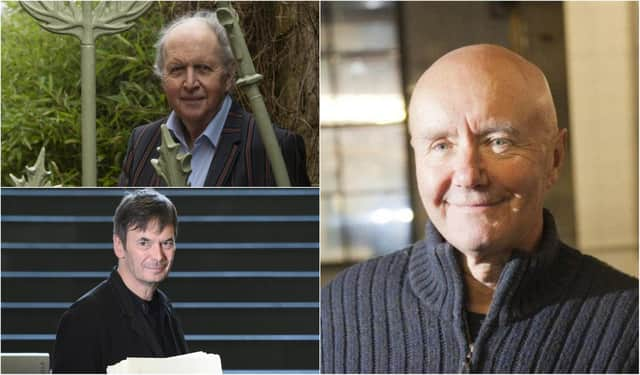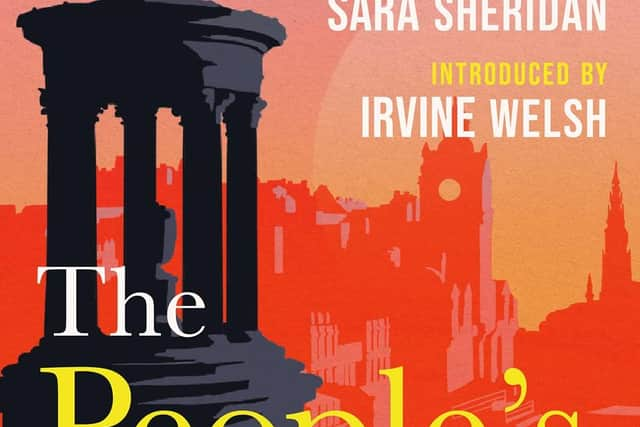The People’s City: Edinburgh authors Irvine Welsh, Ian Rankin and Alexander McCall Smith join forces to fight poverty in the Capital


Featuring short stories by McCall Smith, Rankin, Sara Sheridan, Anne Hamilton and Nadine Aisha Jassat, with an introduction by Trainspotting author Welsh, The People’s City is published in aid of the One City Trust charity, established to ease the impact of poverty through arts and culture.
Edinburgh’s Lord Provost Frank Ross says the book is an attempt to unite the city, and points to a 2020 report suggesting 77,000 people across the Capital are living in poverty – including one in five children – with the numbers rising 25% in five years.
Advertisement
Hide AdAdvertisement
Hide AdIn the foreword, he writes: “The pandemic has also caused great hardship, bringing increased unemployment, the need for food banks, along with a decline in mental health. Data poverty has increased also as the world turns to online meetings as a way to communicate.


“Schools used online teaching methods with children; yet some homes didn’t have adequate equipment. The inequalities have been huge and the pandemic has exacerbated the divide in society.”
The People’s City collects five stories based around landmarks or significant links to Edinburgh, with each author exploring how the city has changed and grown over the decades.
In Hamilton’s ‘The Finally Tree’, a family comes together in the Royal Botanic Garden to learn about its unconventional beginnings.
Aisha Jassat takes us to Leith, to share a young writer’s first encounter with the city that she eventually calls home.
In McCall Smith’s story, late love blooms in Sandy Bell’s bar decades after a first encounter as students.
Rankin brings estranged brothers together to walk the streets of the Old Town and come face to face with their past in ‘Broukit Bairn’.
In ‘On Portobello Prom’, Sheridan explores 1960s counterculture – a young group of friends are at odds with traditions and forge their own path in modern twentieth-century life.
Advertisement
Hide AdAdvertisement
Hide AdThe anthology is introduced by Welsh, who offers a powerful assessment of the city and the place of art and culture in shaping its future.
Welsh writes:
‘It is 16 years since I wrote for the first One City Trust book but, sadly, little has changed in our city or our society.
‘The poorest parts of Edinburgh are still characterised by under-employment, low wages and insufficient access to essential services as deprivation thrives exponentially, passed down from generation to generation like a devastating disease. More people than ever before have been pulled on to the breadline with more households struggling to make ends meet as benefits are cut and community funding slashed. Working people that might once, 15 or 20 years ago, have been considered middle class are now shackled by debt as queues lengthen outside food banks.
‘In places like our capital – a global tourist attraction – the people living there are increasingly irrelevant in a city being increasingly redesigned to attract tourists, wealthy students, businesses and housing developers. The people who bring income are paramount, and our modern culture of cheap Airbnb accommodation, landlordism and commercial development constantly feeds the dominant narrative telling us that so-called “legacy citizens” are unnecessary, even a hindrance, to the city’s progress.
‘In short, the people who actually live in Edinburgh, especially in our poorer communities, are at best forgotten, at worst ignored.
‘Government agencies and the poverty industry are not friends of our communities. All major transnational bodies, governments local and national, and all major political parties are accepting of an economic system that sees poverty as a (regrettable or otherwise) consequence of the enrichment of the already super-wealthy.
‘Whether their posturing is “national” or “global”, such agencies are basically the hirelings of the 1%. Therefore, any attempts to challenge this paradigm are piecemeal and token with progressive policies rarely scratching the surface of such systemic issues.
‘So what can be done to ensure this damaging legacy doesn’t continue from decade to decade? I believe it is time we accept that the state is no longer the driving force for change. It has become purely a tool of capital and now cannot have a role in redistributing power and wealth through the society and community it purports to represent. Therefore our citizens have to find the voice and the confidence to start putting their own structures in place – and there has never been a better time to do it.
Advertisement
Hide AdAdvertisement
Hide Ad‘Over the past 18 months or more, the pandemic has highlighted the existing inequalities that already plagued our neighbourhoods, shining a spotlight on the hunger, debt and hardship that goes largely unacknowledged in the media and by political parties. In the middle of a time when family and friends were pushed achingly apart, communities rallied together, rebuilding safety nets the Government had, year after year, dismantled.
‘People were given a glimpse of what our society might look like if we lived in a more benign world where people come first. That is a legacy we need to build on and help flourish.’
The People’s City is published by Birlinn on Thursday, January 13
On Saturday (January 15), The Scotsman begin a new five-part series of short stories to tie in with the start of Year of Stories 2022. These are extracted from The People's City. Featured writers are Nadine Aisha Jassat, Anne Hamilton, Alexander McCall Smith, Ian Rankin and Sara Sheridan, and each story is set in a specific part of Edinburgh in a specific decade.
A message from the Editor:
Thank you for reading this article. We're more reliant on your support than ever as the shift in consumer habits brought about by coronavirus impacts our advertisers.
If you haven't already, please consider supporting our trusted, fact-checked journalism by taking out a digital subscription.
Comments
Want to join the conversation? Please or to comment on this article.
